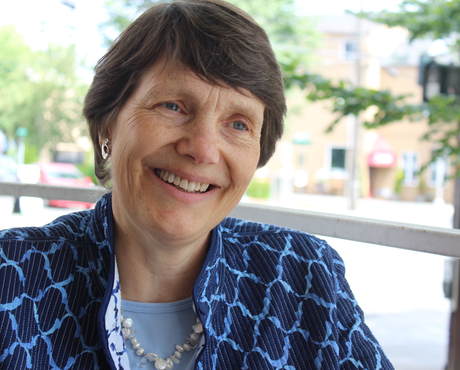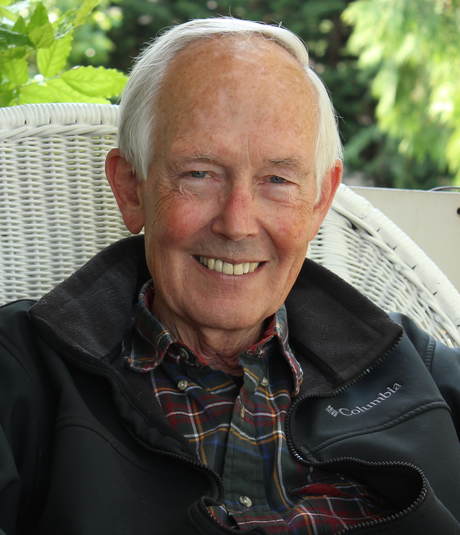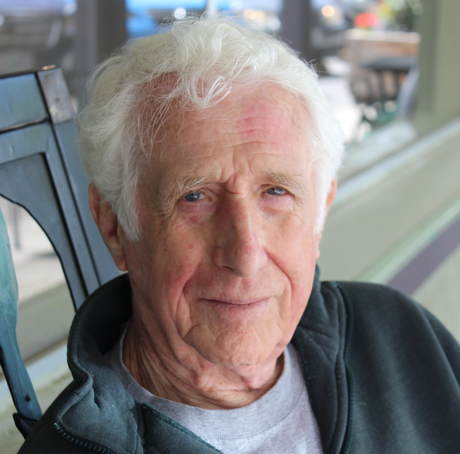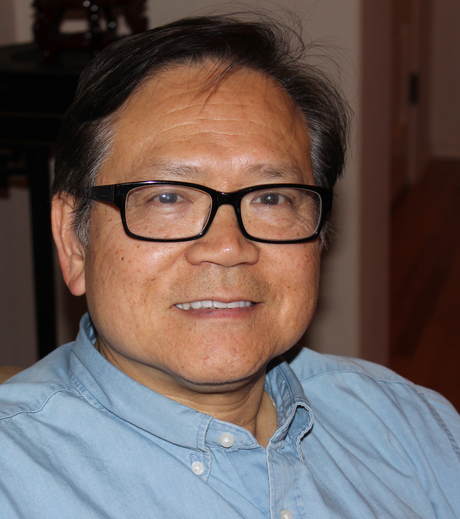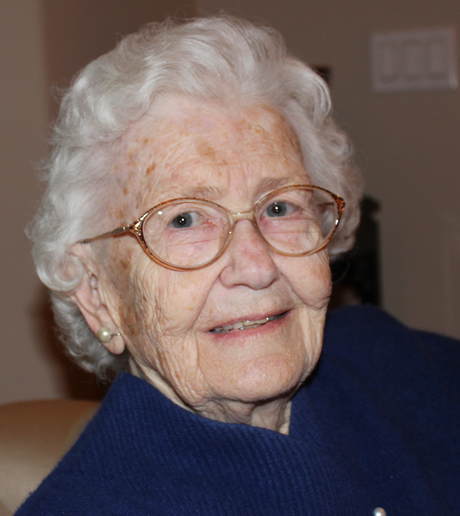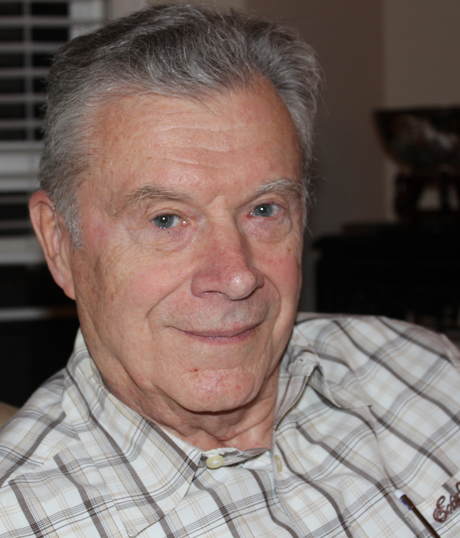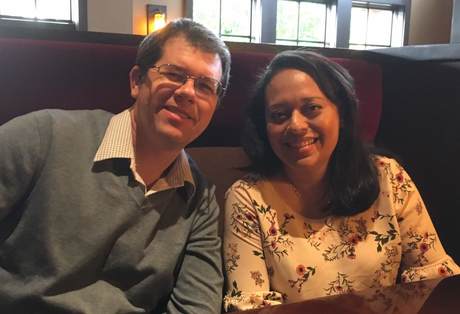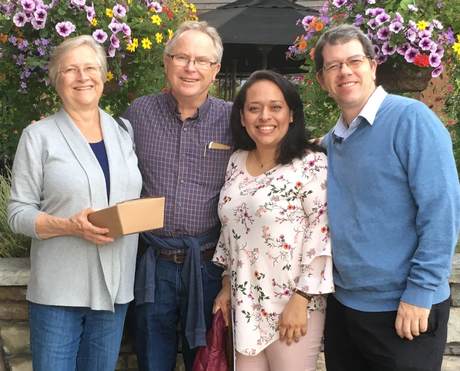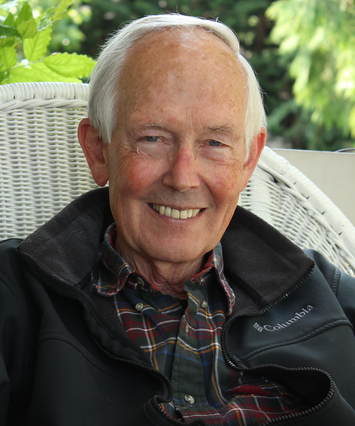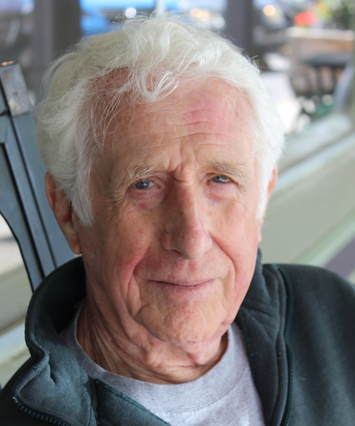In June 2018, Rob and Susan Corcoran spent several days in Seattle, Washington, meeting members of the MRA/Initiatives of Change network, most of whom have been involved with the movement for several decades. Rob conducted taped interviews. The transcripts are lightly edited for clarity and reproduced with their permission.
Julia Sensenbrenner
An independent educational consultant.
When did you first encounter MRA/IofC?
I got involved because of a college friend, Clara Severens. When I was living in Washington, DC, she pulled me in to some of the MRA activities, going to the gatherings that Dick and Randy Ruffin hosted, and there I met Kathy Aquilina.
What intrigued you about MRA?
What interested me was just the approach of starting with yourself, starting on the individual level. It felt right, to change yourself first to be able to make change in the world.
What is most important to you in your life?
I am very grateful for my family and all the experiences that I have had. I feel very strongly that it is important to reach out and to give something back and to be able to support others. I raised my sons in line with this thinking.
What was most important learning experience?
The two years, right after college, when I lived in China were just transformational. In Shanghai, every day I was exposed to a very different culture, learned something new, and was forced to see the world through new eyes. Those were the two most amazing years of my life. I have been a longtime supporter of the Caux Scholars Program, because I know firsthand how transformational such experiences can be when you are young and entering the workforce or finishing up studies. These types of international experiences let young people see the world in a new way, hear different perspectives and learn from others, gain broader insights, and develop new perspectives and passions.
What has been the biggest challenge?
My biggest challenge was my divorce. It was a rough period of feeling deserted and alone, but that was also the time my faith took on a whole new dynamic. I had to rely on the Lord for strength and comfort, and He met me in my hardest moments. Two years later, when I was studying the book of Revelation with Community Bible Study, our small group was talking about the challenges of the tribulation and pondered how we would react if we faced that situation. My group members were uncertain, but I suddenly realized, “I have already been through hell, and the Lord was with me at that time; so, I have no doubt that He will be there and support me in the end times.” That was the first time I recognized that the trials of the divorce experience had given me a deeply grounded faith.
What gives you hope?
I feel grateful that I have been able to work with a lot of young people – high school age – working one on one through tutoring and college counseling, getting to know them and learning what they are thinking and hoping to do with their lives. And they write about some of the transformational experiences in their lives as part of the college application process. Talking to them and reading their essays gives me great hope to see what this generation is thinking and how passionate many of them are about service and the environment. Now granted, I work with a good number of students who have a faith and that factors into it, but I know plenty of students who don’t have faith but still have a passion to serve and change the world. That is what gives me hope.
From your perspective in Seattle are there things you would like to see IofC do more of or pay more attention to?
Recently I have not participated in IofC activities, but I’ve read about Richmond’s Hope in the Cities program and the Community Trust Building Fellowship. I admire what you have done and think it would be beneficial to expand by training even more people to take the approach back into their own communities. IofC and Richmond has much to offer from all your practical experience and the curriculum you have developed over the past 25 years.
David Allen
A songwriter, author and playwright who worked internationally for many years with MRA/Initiatives of Change.
When you think back, what above all do you think was the thing that most intrigued you about MRA? I know that you grew up in it in a sense, but would you say there was one thing that particularly really grabbed your interest and kept you energized?
I was always a creative person and early on I wrote plays and books, and my strongest creation was music. The theater and the chance to put on performances and to go around the world and to give everything in my life towards the vision that my elders had was what entranced me. I don’t know whether I can honestly say it was the original experience of changing my life and giving my life to God. I was young and very impressionable and the chance to go off on this amazing adventure around the world really grabbed me.
Are there things you feel you have carried with you through life that mean a lot to you?
Yes, MRA turned me inside out. It stopped me from being a self-involved kid with my own ambitions to learning how to care for other people. And so very much later in life when I was in charge of a group of chief executive officers trying to rebuild downtown Tacoma, I suddenly reverted to my old MRA training which was in honor preferring one another, making the other a much bigger person than he or she ever thought they could be. And I learned the habit of listening to them, of becoming trustworthy to them, letting them dream and holding their hand and letting them do their own dream of remaking the city. And they did. They succeeded in remaking a city. I often thought it was the listening habit. “Forget yourself and go all out” is something we said in MRA, and I learned to forget myself and go all out for other people and help them achieve their dreams.
The other thing I learned was to take time in quiet. I’ve done that all my life, a habit that was inculcated, so I have been a thoughtful person always, and in the years that I was guiding theses executives I was listening and writing every single morning, thinking out the day and what I could do to help them achieve their goal of remaking Tacoma.
What has changed and what has not change? As you think about life and your approach to life are there things that have changed in your own approach and things that have remained constant? Has your life caused you to think differently about things?
Very much so. Life is an evolutionary journey; we migrate from our young selves to our old selves through many pitfall and sudden realizations, I’ve made a lot of mistakes, but I often think of what I wrote about Mahatma Gandhi on the Yatra (a journey that a group of Americans made with Gandhi’s grandson on the anniversary of his famous Salt March that launched the independence struggle) that a mind filled with answers cannot grow. “New occasions teach new duties; Time makes ancient good uncouth; They must upward still, and onward, who would keep abreast of Truth.” (James Russell Lowell) And so, I hope that I have upwarded still and onwarded through my life, and that what was Truth to me as a young man has evolved to a new truth in new times.
But I have always felt I want to grow throughout my life; I want to read and develop. So MRA was a launching pad for me. It was like the first stage of a moon rocket. You discard the first thing that gets you into earth orbit and then you go into trans-lunar orbit and you discard that and then you get into a capsule and then you land on the moon. And is it right or wise to say ill of any of the things that launched you or got you where you are? No, I don’t think so. They were all essential, they were all part of making me who I am as a developed human being.
Is there one experience that you think about as your most important learning experience, that stands out for you as pivotal?
There are too many moments to single out only one. So many experiences have shaped me. I’ll never forget one. I was a soldier in combat in Vietnam in the fall of 68. I went to Vietnam on fire. I thought I wanted to save the world from communism, but I was completely disillusioned by the war. I found that we were in the wrong war. I learned a lot from that experience. These are very searing moments.
What was the biggest challenge in your life?
It really has to be my decision to break away from the cocoon in which I had been living for twenty-six years with MRA to join the army and start a life of my own. All the framework had gone. I had chosen myself to exit and I had to build a life. I started off totally naive. I didn’t know what my morals were independent of MRA. I didn’t know what my choices would be, and which direction I’d go, so the whole world was suddenly in front of me. I think the big challenge was separating myself from the relative safety of a known framework for my life into being entirely on my own.
If you were to rerun your life is there anything you would like to do differently?
I’ve made all the financial mistakes that a person can make, partly because I was very naive and I came out of MRA trusting people and not being shrewd or distrustful to the extent that that you have to negotiate with them and be wise and wary, and so I was ill-equipped to face the hard realities of life.
I have made personal mistakes in relationships that I am appalled at looking back and thinking about them. But I am not morbid, I don’t feel like I want to rewrite my life. It has been an amazing journey.
What makes you stronger, what bolsters your spirit and gives you hope?
One of the lowest moments in my life was after the 2016 elections. I went into a real depression for a day. I said to myself on the second night, “I am no use to anyone the way I am now.” So, I had virtually a resurrection: “I am not going to choose the course of depression, I am going to choose the course of renewal and revival and resistance.” You know the serenity prayer. I turned it around: “I refuse to accept the things I cannot change and choose to change the things I refuse to accept.” It is primarily a determination to give in to defeat or to be part of the resistance, partly through politics, but every time you see something wrong like discrimination or bullying, or crude language, or all the things that are afflicting America, you don’t sit there, you stand up and you fight. After the Muslim ban that Trump announced there was a lady in Britain who gave out safety pins that meant, “You are safe with me, if you are a Muslim, if you are black, Latino, if you are different from me. If you are feeling oppressed, you are safe with me.” So, I started wearing a safety pin. I emerged from depression.
The rest of my life is going to be given to fighting back. When I went into the army I raised my hand and swore to defend the constitution of the United States against all enemies foreign and domestic, so help me God. Vietnam was my foreign enemy, but I feel now that my country in various guises and forms is confronted with domestic enemies. And I vow to defend my country against all enemies; that oath still stands.
What advice might you give to anyone starting out with this work of Initiatives of Change today? Things to bear in mind? We have a whole new generation taking responsibility who have very little historical background.
Frank Buchman’s magic was that he had unlimited vision of who you could be. It took your breath away. It said, “You have this life ahead of you; you could become way beyond what you are thinking.” And that vision attracted people to him from prime ministers to sweepers and to people like me. My goodness, I could live this one precious life on an unimaginably big scale! That would be my advice to young people joining IofC today: be breathless about what you can do with your life. Don’t just join up with an NGO but think about how you could become a Joan of Arc or a Mahatma Gandhi. They were both ordinary people. I think that what attracted me, as soon as I was aware enough of what I had gotten myself born into, was that I could live an amazing life of change in the world. And even if IofC is just the starting point of your life, use IofC to develop yourself as big as you can possibly imagine.
Paul Colwell
A singer-songwriter who, along with his two brothers, formed the Colwell brothers. As rising teenage stars in the early 1950s, they encountered MRA and devoted their talents to bringing change to the world through music. They were the impetus behind Up With People which has engaged thousands of young people. Paul is a high school paraprofessional at Vashon High School and still plays in several bands.
What was it about MRA that grabbed your attention or intrigued you?
It was 1951 and we saw a play in Los Angeles called Jotham Valley with our parents. In the play, the brothers were feuding, and of course we three brothers were playing music together, so that story appealed to us. And then the people we met – there was a quality there that pulled us in, they were outgoing, they were friendly, upbeat. It definitely grabbed our youthful idealism. In the 50s there was very little going on that was related to doing something to making a difference in the world, so it was the scope – that was the other thing – right away we heard about what MRA was doing around the world and the leaders who were involved, people of significance.
The global vison?
Yes, it was not a just some small movement; it was something pretty big and important. And then as brothers it touched us personally in terms of our own lives. The logic of changing the world was something we really hadn’t thought about; the idea that if you want to change the world then you’d better make some changes in your own life. And we all kind of went through that, it was very enlightening to us.
So, you have been at this for more than 70 years…
I was 16 when I first saw Jotham Valley.
Life has its ups and downs and takes different turns. Are there things in particular that you feel you have carried with you, that have remained constant?
Certainly, our world view, our experiences as we traveled, our appreciation of other cultures, and the realization that we are all in the world together and that we have to work things out together. The idea that everybody is important: “Up With People.” It’s recognizing our common humanity. The other thing we learned a lot about was caring for people, caring for everybody, noticing the person who is being left out, and paying attention, really paying attention to people. In my work in the school now I try to get to know everybody’s name. You’ve got to notice kids, you know, they want to be noticed, they want to be recognized. People are more important than things – that is something we often talked about. Then integrity. That’s a term that covers a lot of territory. We’ve had our ups and downs, but I think that we have hopefully carried it though our lives.
What has been the biggest challenge you have confronted?
Marriage! I grew up with brothers, I had no idea, I knew nothing about girls. We needed a sister, but we didn’t get one. To stay in a marriage and a relationship, that’s as big a challenge as any. The other has been the challenge of writing. I am rather a perfectionist, so I approach writing songs with great trepidation, and having to produce a show every two years – we were on a two-year cycle because of our marketing so you had to create a whole new show. The research part of it was interesting, because you got to see where the world is and what you want to say. But the other thing is you had to come up with new ways of saying the same thing over and over again.
Someone asked me once, “What inspired you to write a song?” and I said “Fear.” The constant pressure, the stress of having to write. As a result, I have never written a song I didn’t have to write. I don’t just sit down and say I think I’ll write a song. I did do that once or twice back when we were kids, when we were recording for Colombia records.
I don’t think people realize that aspect of writing or any kind of creativity.
Particularly if it is an assignment. You’ve done some of that yourself.
Someone was reading my book and she asked “What is your writing practice? “and I said basically I sit down and work at it until something comes out the other end. Inspiration doesn’t always pop out like that.
Yes, a lot of perspiration!
Is there anything that you would do differently if you had another run at it?
No, I think I have kind of come to terms with who I am. I have traveled a certain road and it’s been a journey of growth and learning and ups and downs. There are a lot of things in the way I do things that I would change. I am not well organized, I don’t have great discipline, I procrastinate. I wish I had wasted less time, but sometimes in the creative field that is not wasted time.
Perhaps also the way we hooked up with our mates. I would have taken more time to get to know my wife and let her get to know me, but we were always on the run, we did it in the fly.
Still it turned out pretty well!
Yes, it did! But I would have done more of a normal courtship. But it wasn’t to be, and we’ve hung in there.
What keeps you strong, what bolsters your spirit, gives you hope?
Young people. Those of us who have experienced the great expanse of history and seen all the changes and see what is wrong with the world, we see the world very differently from the kids I deal with at high school. They’ve got great enthusiasm, great passion for music, wanting to make a difference. I was working on the scholarship committee reading their essays. They were all about wanting to help their fellow human beings. That gives me hope. You’ve got a generation with probably more stacked against them than we’ve ever had, because back in my childhood it was the threat of atomic annihilation, but now you have the possibility of an environmental end of things. It’s interesting – the world comes together and then falls apart – that may be a cycle as well, and the fact that this whole trend of nationalism is a reaction to some of the things that are wrong about globalization. These things have to be adjusted. But young people are in the world that that they’re in; they just take it for what it is and move on from there. I think there is a lot of commitment in young people to do something for the environment, for helping people who are struggling. This has been my experience.
What advice would you give to the next generation who are starting out on this journey of world changing, life changing? What thoughts would you want to pass on to them?
First of all, you want to encourage them in the good things they want to pursue. My advice would be to do something that will make a difference but don’t feel as if you have to do everything; and to treat people well, treat people with kindness, even people you don’t agree with. Try to listen to those who don’t agree with you and try to understand where they are coming from because we are in a very polarized state of the world now. Be open, have an open mind, don’t latch on to one opinion and then say that anyone who doesn’t agree with you is your enemy. Realize that they are human beings and that there is a reason for them believing what they believe. Never give advice. Wait a second, I just did!
Having been part of and experienced the evolution of MRA/IofC over many decades, some of which may have been better than others, where do think its best contribution can made in the word? l was interested in your advice to young people to get involved but don’t try to do everything. My impression is that in earlier years one of the mistakes MRA made have made was to think that we could do everything, that we were the only ones.
Yes, it's just like you said. We wrote a song once, "This is it, no sense in looking anymore.” Of course, what we were doing was just a part of the big picture. Years later we wrote another song called "Where the Roads Come Together" that had the line "There are many roads to go…” I think we've all evolved and expanded. You asked what I thought might be IofC's best contribution at this point. I'm in no position to give advice on that but would just say keep doing the important work you're doing in the world, like all the impressive things you've done in Richmond. And I'll keep trying to do my part.
Al Ngai
A retired researcher. He worked at the University of Washington School of Medicine.
When did you first run into MRA?
It was in 1978 when I was a graduate student at Virginia Commonwealth University in Richmond, Virginia, when I met Ruth Clemo. She invited me to a function with several people involved in MRA such as Rajmohan Gandhi. I attended some meetings and then I moved to Seattle.
What was it about MRA that intrigued you?
Being from Hong Kong we have a Confucian education system in which moral ideas are very important.
So it connected with your cultural background?
Yes, it echoed some of the Confucian ideas like starting with oneself and then you go on to your family and country and the world. So that all sounded very Confucian and very familiar.
And did you find that it was practically useful to you in some way in life? Or was it more a support to what you already believed?
I would say it supported what I already believed just because I already had that sort of background.
What would you say has been the most important learning experience in your life? Does anything stand out for you?
I had to pursue my university education and I moved from Hong Kong to the United States. First landing in San Francisco and the weather was a little bit cool; and then came the next big shock of attending college in Nebraska where I looked around and I couldn’t find any trees and it’s very flat! But the learning experience was small town America, how people in small towns live. If I did not have that experience I would never have got it because I tend to favor the coastal cities because it is closer to where I came from.
What has been the biggest challenge that you have faced in life and how has your personal culture and faith background supported you in that.
The biggest challenge was probably deciding what to do with my education and my career, deciding between medical school or research and I chose the latter. I am glad because it allowed me to have some scientific achievement and it allowed me to help a lot a lot of students. I don’t think I would have been a very good doctor.
What do you find bolsters your spirit and keeps you going? What gives you hope?
That is a tough question because I am naturally an optimistic person. I think that if the world is down it eventually it will be up again. I have lived long enough that I’ve seen cycles. I am not a Trump person, but I don’t see him wining the next election. I look forward to the next election and being able to support a better candidate. Other than that, keeping an eye on my son! Also, I have responsibilities for my family in Hong Kong specially my mother who is 86 and who has osteoporosis, so I am going back more often to spend time with my family. So mostly for me it is focusing on my family.
Phyliss Guldseth
When did you first encounter MRA or the Oxford Group?
My parents met the Oxford Group in 1931 or ‘32.
What interested you?
My Dad was a preacher and he had his office at home. Morning quiet times were part of the daily routine; that was the way we lived. I mean it just seemed like the thing to do. I was the oldest child. Two years later my brother came along, and six years after that a baby brother.
It made sense to you in a practical way?
Yes. One day it came to me that I had told a lie to one of my school chums and I needed to tell her the truth. So, my mother asked me a few days later, “Have you talked to Beulah yet?“ and I said no. She said, “Well you’d better to do that hadn’t you?” I finally did it and I felt OK, I’ve got my friend back, I am not afraid to see her any more.
Do you feel that the quiet time has been something that has been useful to you throughout your life?
Yes, because it is always combined with reading the bible. I had a major conflict when my parents were indoctrinated by a psychologist who said don’t give your children any physical affection, and this had a major impact on me for a number of years. I found out that there was an English psychologist who was writing books and teaching that there is a way to recovery. I read her book and she suggested that if you can’t work it out with your same-sex offender, my mother, you can work on it with a same-sex counselor. I decided to do that, and I visited with a lady at my church because I needed to talk with someone honestly. And I went home, and I said, “OK. Lord, I have done what I was led to do.” And in the morning, I felt entirely different. I didn’t feel like crying any more. It was a wonderful experience and it was through a Christian psychologist.
What has been your most important learning experience in life?
Well, the one I just described really turned me around because I felt that I was walking about an inch off the floor. And when I told my youngest brother about it he said, “Well I don’t know about that, but when my wife came home from her last visit she said, ‘Phyliss is sure different with her mother!’” I didn’t know that I needed to be different, but I was different! And I told my story at my Lutheran church. The next morning, I had a phone call from one of the men and he said, “Thank you so much for telling your story, because you could have been telling my exact story.” He had an impossible relationship with his father.
David Haa
A retired Merchant Marine officer and former union official.
When was your first encounter with MRA?
About 1959. The world premiere of The Crowning Experience was being held on Broadway and I took my wife to see it. After the movie, I bought a copy of Brave Men Choose which I really appreciated, and I also subscribed to New World News. I was just out of the Navy and I went into the Merchant Marine. I traveled and started a family.
Years later, my second meeting with MRA was when I was the newly elected Baltimore port agent for my union. We were affiliated with the International Longshoreman’s Association. Part of my duties was to be a delegate to the Metropolitan Baltimore Labor Council. I would attend monthly meetings there and I would go with the ILA officials. One day there was an announcement from the Chair asking the delegates if it would be OK to meet some guests who wanted to address the meeting after the regular business meeting. So, I sat around with several of the delegates, and who would appear but James Houck. (Houck was a businessman who encountered the Oxford Group in 1934 and knew Bill W., one of the founders of Alcoholics Anonymous. After he retired he got to know some of the Baltimore longshoremen.) Jim had Paul Campbell and Bill Jaeger (two MRA leaders) with him; it was a dynamic team. Jim served as MC. It was very well received.
Jim’s main project was focusing on the racial situation with the Longshoremen in Baltimore where the court had ordered the black and white union locals to merge. Jim took it on himself to be a peacemaker between the two sides and to help any way he could. Jim saw me sitting there and we introduced ourselves. I said, “I have met MRA before. I saw the Crowning Experience.” He said, “What did you like about the movie?” I said, “Well the thing that impressed me the most was the section where they introduce sweet potato pie!” Jim would tell that story many times when he was introducing me to other people. This was the late 70s. I was in Baltimore for five years. During those years in Baltimore I gradually became Jim’s right hand man. Whenever I could, I would join in with whatever Jim had going. I got to know Dick Ruffin in McLean and went one summer for a couple of weeks to Guatemala with the MRA team. Then I got transferred to Seattle. Six months prior to my move I went to an MRA conference in Georgetown and I met a couple from Seattle, Fos and Sunny Powell. This led to my involvement with the MRA team in that area and the Pacific Northwest.
What are the most important things that you feel you have carried with you as a result of your encounters with MRA/IofC? How has that been useful in your work and life?
I think it is sometimes who you are, that MRA reinforces and brings out the best. I have always believed in giving everybody the benefit of the doubt. Don’t assume the worst or the negative. The basic core precepts of MRA rang so true: the four absolute standards, the quiet time, meeting with other people who are following the same concept where you can share your guidance. We are still doing this in the Seattle area, those who are still alive.
To me being able to live an honest life in every circumstance is critical, and I also feel that if you can be an honest person yourself, dishonest people can’t win over you. You see clearly. All the four standards are important, but I also like to use the word moderation. I do have an occasional glass of wine, and I have a long-distance girlfriend in Baltimore.
What keeps you going, what gives you hope?
I am a pretty faithful citizen, but the courts, lawyers - and most politicians are lawyers – have misinterpreted the intent of the constitution and the power of money in this county is overwhelming. Parkland students are trying to make a difference and things are being turned around and thrown at them. My hope is not very high these days, but I believe strongly in the serenity prayer.
Ric and Pilar Griffin
Educators, they are alumni of the Caux Scholars Program and Action for Life.
What intrigued you about IofC or MRA as it was then?
Ric: For me it was the vision of making the world a better place through moral standards. When I went to Caux for the first time I saw this in the leaders of the Caux Scholars Program. The experience of Caux opened my mind that there is a bigger world out there.
Pilar: I would say the challenge of the values. I questioned the word “absolute” a lot because I grew up with the values of love and honesty, but it wasn’t until I really had time – quiet time – that I analyzed what absolute love and honesty meant for me. The challenge of a higher standard, something that I will probably never reach, but it is helping me to improve myself in the way I interact with others. The practice of those values is going to impact the rest of the world, our relationship with our husbands…
Ric: I can testify to that!
Pilar: …our parents and children.
Pilar: So, this challenge was really very appealing to me. I met a lot of people from around the world in the Caux Scholars Program and then in Action for Life. A lot of people who felt the same challenge and who wanted to respond to that. Our response may not be very loud to the world, but I think that wherever we are we are trying to be beacons of light with those values that in one way or another we impact the world. And for me, I feel I have a community that supports and makes me strong and I like that; it’s my family of Initiatives of Change, people who speak the same language.
Ric: From Action for Life I carried a confidence that I could listen to my inner voice and get answers. I write it down. I would feel connected to something inside that was leading me in the right direction, and that gave me confidence that I was not alone and had a more positive direction in my life.
Pilar: And I think that has been very useful now that we have a family, and I can hear Frederic all the time saying to our children, “Listen to your inner voice.” Having that space to listen, that is something that the world needs. The world is really busy with many voices, and we really don’t have that space to listen; and IofC for us was the practice of quiet time and listening to that inner voice. It brings peace to our life, and in my case it is related to unselfishness. I can really hear where I am needed, how the situation where I am right now is impacting others. I embrace that and the reassurance that this is where you have to be and how you are reaching other people. We are at a stage of life where our priority is our children, so all this knowledge has been applied in our children, and our hope is that they will be passing this to our grandchildren and maybe to all the people they will encounter in the future.
What has been your biggest learning experience?
Pilar: Trust. For me trust that there is a time that there is a moment for everything in life. Trust that the people who are around you are the people who are supposed to be. Trust that the stage that the world is in right now is a stage in history of humanity and that it is part of the process. I trust that I have space in that process and that I have some power in that immensity. Also learning to value diversity. IofC was a door to so many people from so many countries around the world. With Action for Life we had friends of all ages, languages and faiths. And I was learning to love them all and show that we cared, and we wanted to learn. That was something that marked my life.
Ric: When I was going to university to study my undergraduate degree in print journalism, I got a letter from my grandmother, Peggy Davidson, with a brochure for CSP. I investigated it and I applied. That letter was a defining moment in my life and opened so many doors. CSP opened my mind to the world. Action for Life opened my heart to the world. And it got deeper and more profound.
What has been the biggest challenge?
Ric: Learning to trust that we are here for a purpose, that God is with us, that we have to be faithful, that we’ve got to walk our talk.
Pilar: Learning to let go. My personality is very clear, and it is very easy for me to take decisions. Working with other people I realized that their ideas were different and even better than mine. In Action for Life I learned a great lesson. I had to let go the perfect way that I had planned an event, to welcome other ideas and be happy with that; and I felt so happy when I could see a 19-year-old plan a whole event and I thought yes, the message is getting through and that’s the purpose. It’s not my way. I am so involved in logistics and small details, but this person is using art to express something and that’s OK, that’s what is needed right now. I have to let go of many things in life, thinking that I have the right answer.
Is there anything you would do differently?
Pilar: No, I am a person of faith, so I absolutely believe there is a plan for me. I grew up with a very strong faith in a family that supported me, and my response has always been wherever you want me I am here. We are very different in personalities, but God put us together for a reason. I value Ric in my life and all that life has offered me in many different areas.
Ric: It took me a long time to get a vision of the world and how things worked. I enjoyed my childhood, but it was pretty sheltered in some ways and I think maybe a stronger preparation for what the world had to offer might have been helpful, getting on the right track earlier on. Figuring out what I wanted to do has been frustrating at times.
We were talking earlier about the challenges in the country right now, and globally, the fears and frustrations. As you look ahead, what gives you hope?
Ric: Overall, I think we are heading in the right direction but on the surface, it seems not. I think that people are recognizing the need to accept each other, that we understand where a progressive or more humane point of view is coming from... maybe the example of Starbucks where they kicked two people out for using the bathroom and yet they turned around and they had an education day for their employees. That would not have happened years back. And so, just realizing that it is messy, that we are human, that we are always going to be making mistakes and that we have a short memory. But is seems like for the world things are headed in the right direction. People are fighting against that direction, so you’ve got to focus and use your energy wisely. Focusing on the negative becomes as much part of the problem as the solution. We’ve got to find ways to talk with each other, like IofC has demonstrated, just like the French and Germans after the war, they healed those wounds. So, I think seeing the positive, being proactive and trusting in the good of all humans. Being negative is not the solution, although we do need to speak out in a polite, positive way.
Pilar: I work with children, so my source of hope is children, first to teach them their value and their value to transform the world. My dissertation is about human beings’ energy for transformation, generators of a new educational paradigm. Every human being is energy, energy for transformation and we decide how to use that energy, so creating that awareness in every child I encounter. You have the power and you choose, and when you choose you are creating a new paradigm, a new model for the world, you are teaching other people that this is the way to resolve conflict. Every single day we are making decisions and those decisions are teaching others: how I interact, how I talk, how I smile, my energy. I say good morning to all the parents in the morning. Today nobody responded, but I had a smile, and said good morning. That is my paradigm and one day somebody is going to say good morning back. I lower myself when I talk to the students. This is respect for another human being, that is receiving love from me. They may be in a difficult moment, out of control, but they deserve my respect. So, they are my hope.
Also, the story of people who are doing amazing things around the world in every field, the environment, housing, children, natural disasters, conflict areas, people working together to support each other. We choose, and that gives me hope, that we have the power of choosing.
What would you say to people who are just starting on this road of faith? What encouragement would you give them?
Pilar. Two questions: Who are you? Tell me who you are, I want to know you. And teach me something you are really good at. We all have something to offer. Open the door for someone to express who they are and to share who they are.
Ric: I want them to know that we are more than just our minds and bodies and emotions. We have a spiritual nature that needs to be explored and nurtured, and there is a very important part of us that is connected to the universe. Getting to know ourselves is very fulfilling and gives a deeper sense of happiness than anything else, more than physical, emotional or intellectual rewards.
English

